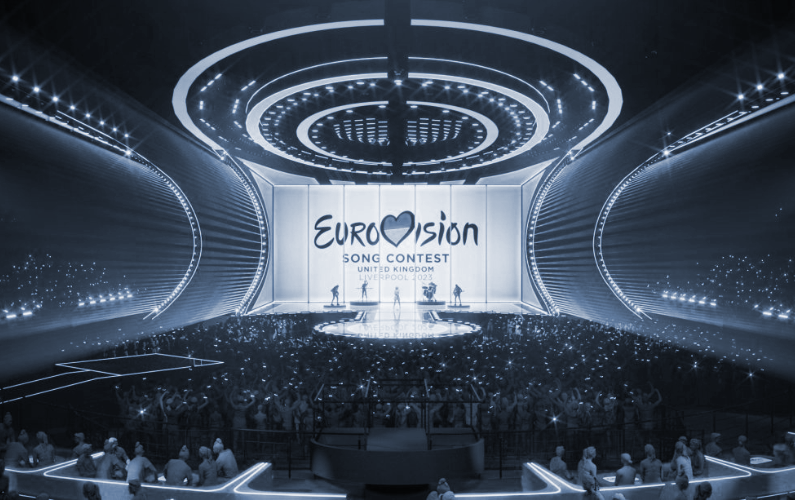- For the first time, the business world seriously embraced Eurovision as a promotion channel.
- Our analysis found that brands like Booking.com and Baileys received favourable media attention for assuming Eurovision’s unity message, while TikTok tried to improve its damaged reputation by sponsoring the event.
- We also found that no brands managed to enter the Twitter discussion, which was dominated by a transgender row, amplified by JK Rowling.
View a one-page infographic summary of the analysis
An estimated 30,000 people travelled to Liverpool for this year’s Eurovision, which is being watched by an audience of millions.
Interestingly, Eurovision has not become an advertising hot spot despite reaching such a vast international audience who are dedicated to the spectacle. But brands are beginning to wake up due to a renewed appreciation of the contest.
To see how brands used this year’s event to promote themselves in the media, we analysed 1,247 English-language articles published in the last month. Here’s what we found:
1. Brands discovered the PR power of Eurovision’s unity message
U.K. agency Superunion and Ukrainian creative studio Starlight Creative collaborated to bring this year’s Eurovision to life for the public through a new visual identity and slogan, “United by Music,” both of which represent the special partnership between the U.K., host city Liverpool and Ukraine.
This presented a unique opportunity for brands to align themselves with a message of unity and solidarity.
We found that online hotel reservation maker Booking.com, an official sponsor of the event, managed to become the most visible company in the media debate in terms of media mentions:
Tapping into the number of people who travel to attend the contest, Booking.com highlighted the unity idea, which it claimed aligns with the brand’s own values of reaching a global audience.
Similarly, the easyJet airline, which was announced as a National sponsor of Eurovision, gained its media visibility by noting that just like this iconic competition, it connects people, cultures and communities across Europe and beyond.
Baileys, which received far less media attention, also tried to be on the radar with a unity message. The brand inked a three-year deal with Eurovision and enlisted the 2014 winner, Conchita Wurst, as a brand ambassador. it wanted to be part of the “world’s most joyful global celebration of inclusive and diverse cultures and communities”.
So iconic is Wurst, she also appeared in Booking.com’s campaign.
2. TikTok used Eurovision to clean its image
TikTok was named the Official Entertainment Partner for Eurovision, launching its “Where Stars Get Started” ad campaign, featuring Sam Ryder, the platforms Eurovision ambassador and last year’s runner-up artist representing the U.K. Ryder himself was discovered through singing on the platform and building a loyal audience.
The campaign has been running on billboards across Liverpool, shining a light on how stars get started, like Ryder.
Many media outlets noted that TikTok is owned by Chinese internet company ByteDance, which argues that it does not share data with China, but Beijing’s intelligence legislation requires firms to help the Communist Party when requested. Eurovision also followed the UK government banning TikTok from official devices.
TikTok has been embroiled in a PR crisis ever since Donald Trump threatened to ban it from operating in the US in 2020 over concerns that the platform could pass US data to Chinese state agencies. Sponsoring Eurovision was seen as an attempt by the social media giant to reposition itself as a trustworthy and engaged global player, aligning its brand with the positive and culturally unifying aspects of the contest.
3. No brand penetrated Twitter, as the debate was dominated by transgender row
Analysing 1,19 million tweets around Eurovision posted in the last month, we found that no brands managed to penetrate the conversation as it was overwhelmingly dominated by a controversy involving Ireland’s Eurovision act, Wild Youth. The band decided to sever ties with their creative director, Ian Banham, over comments he made on social media regarding transgender individuals. Banham’s posts, which referred to transgender women as men, came to light after he criticised a news article that referred to Zara Jade, a transgender woman convicted of assaulting her partner, as a “woman”.
Wild Youth, stating their commitment to “unity and kindness”, announced they would no longer allow Banham to be part of their team. This decision sparked a reaction from renowned author JK Rowling, who accused the Irish act of “preening, self-satisfied misogyny”. Rowling, who has previously faced criticism for her views on transgender issues, defended Banham in a tweet, arguing that the re-traumatisation of female survivors was being ignored when a transgender woman is referred to as a woman by the press.
Rowling’s defense of Banham, posted with the hashtag #IStandWithIanBanham, further amplified the controversy. Banham has previously worked with notable artists such as Lily Allen, Kylie Minogue, and Cheryl. This incident, and the subsequent involvement of JK Rowling, overshadowed other discussions related to Eurovision on Twitter, making it challenging for brands to enter the conversation.
The Eurovision controversy demonstrates the power of social issues in dominating online discussions, often overshadowing other topics or narratives. In this context, brands seeking to engage in such conversations need to carefully consider their positioning and approach, ensuring their messaging aligns with their values and the expectations of their audience.

